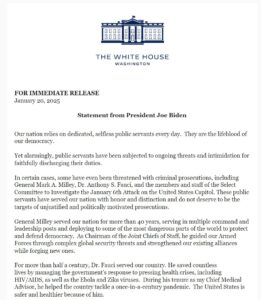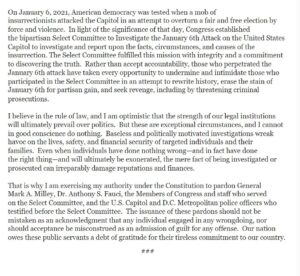In his final hours as the 46th president, Joe Biden issued preemptive pardons to protect several political figures from potential criminal investigations under the incoming Trump administration. The recipients included Dr. Anthony Fauci, former Chief Medical Advisor; General Mark Milley, former Chairman of the Joint Chiefs of Staff; and members and staff of the January 6th Committee. Notably, the pardon extended to vocal Trump critics like former Rep. Liz Cheney and Rep. Bennie Thompson, who co-chaired the committee investigating the January 6th Capitol attack. This move was in response to threats from Donald Trump, who had accused Cheney of criminal acts and hinted at pursuing legal actions against her and others.
Preemptive pardons are a use of presidential power where no charges have been filed, aimed at preventing future legal action, which is both a constitutional right of the president and a subject of debate regarding its appropriateness and implications.
As a retired General, Milley’s actions would typically fall under military jurisdiction if they were related to military duties. However, the President’s pardon power extends to both civil and military offenses. If Milley were accused of a military crime, a presidential pardon could theoretically cover such offenses, provided the crime was not part of a court-martial where specific legal processes might apply differently. However, no specific allegations against Milley for military crimes have been mentioned in the context of these pardons.
Preemptive Pardons Explained
-
- Legal Basis: The U.S. Constitution grants the President the power to grant pardons for offenses against the United States, except in cases of impeachment. This power is broad and includes the ability to issue pardons before any formal charges have been brought, known as preemptive or anticipatory pardons.
- Process: Preemptive pardons are issued without the individual having been charged or convicted of a crime. They are meant to shield someone from future prosecution for actions that have not yet resulted in legal action but might in the future.
- Controversy and Rarity: While legally permissible, preemptive pardons are rare and controversial because they raise questions about the integrity of the legal process. Critics argue it might suggest guilt or interfere with justice, whereas proponents see it as a protective measure against perceived political vendettas.
- Application in This Case: In the context of the pardons issued to Fauci, Milley, and others, the intent was to safeguard these individuals from what was perceived as potential misuse of prosecutorial power by the incoming administration.
- Implications: Accepting a pardon can be seen as an implicit admission of guilt, although legally, it does not necessarily imply that the recipient has committed an offense. The pardons issued by Biden were designed to not be mistaken as an acknowledgment of wrongdoing by the recipients.
Biden’s pardon of Fauci is his worst one yet. He deserves prison for life. pic.twitter.com/f4R62jETbY
— End Wokeness (@EndWokeness) January 20, 2025
Statement from President Joe Biden | The White House


Help American Liberty PAC in our mission to elect conservatives and save our nation. Support – American Liberty PACB
